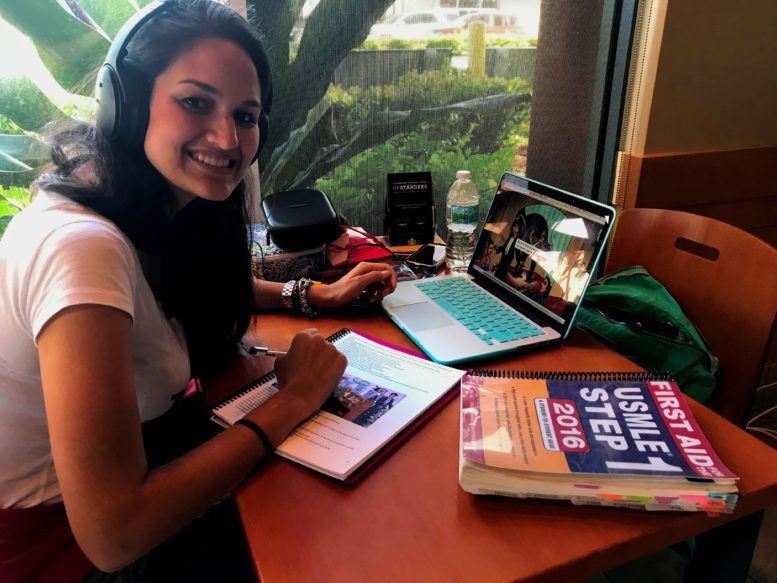
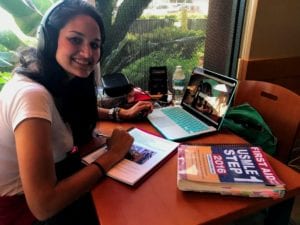
It seems like just yesterday the East Coast of the U.S. and the Caribbean experienced not one but two devastating hurricanes. Many watched as islands near and far were blown flat either by Irma or Maria, or both. The world was at an ominous standstill after the back-to-back hurricanes dissipated, and in their wake they left a far different landscape for the inhabitants of the Caribbean and the Florida Keys.
But it was on the island of Dominica after the onslaught of Hurricane Maria that Shany Quevedo stepped up to help her fellow students and teachers of Ross University School of Medicine, with a sense of order and calm in the chaos.
A stunningly focused and ambitious young woman, Quevedo was on Dominica at the time, studying to become a surgeon. In her second year of medical school, she aspires to work at Jackson Memorial Hospital here in Miami after she finishes her degree.
Quevedo’s dedication to the welfare of people was put to the test in the most trying time of her life – the aftermath of Hurricane Maria. In a time of crisis, her caring nature became absolutely necessary to provide not only psychological stability for her peers, but also to step up to effectively delegate myriad responsibilities.
Her story actually begins with Irma, the first hurricane to hit in early September. As the warning went out for that storm, Quevedo hunkered down with friends and expected the worst. When Irma landed on Dominica, its strength had already diminished, and she thought, “If this is a hurricane then we have nothing to worry about.”
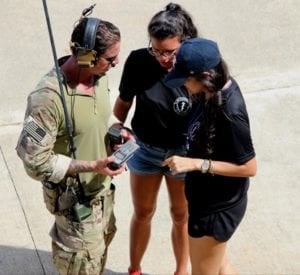
Because the island only suffered a few downed trees, many felt it was no big deal. Says Quevedo, “Honestly, with the exception of the initial scare, not much really happened” – other than lulling everyone into thinking they didn’t need to prepare for the next storm, Hurricane Maria.
And they really should have. Maria was truly horrific. It all but entirely destroyed Dominica. Roofs were blown off, hundreds of homes were essentially gone, roads became impassable, and there was no food and water available in the country. Except for at Ross University where there were some supplies.
Hurricane Maria struck Dominica on Sept. 18 as a Category 5 hurricane, unbeknownst to most in Dominica whose last notice before the electricity went out was that it was going to be a Cat- 4. The super storm struck with gale force winds, and if Hurricane Irma didn’t rattle Dominica, Maria surely did.
Locked in a bathroom fortress at her friend’s apartment, Quevedo could hear the wind slapping the walls. At one point, her friend grew curious to see what the apartment looked like beyond the protection of the bathroom, but when she took a peek and saw water seeping in through the windows, she decidedly slammed the door in front of her.
One of the lesser known effects of a hurricane of that magnitude is the quick change in air pressure. Quevedo asked her friend, “Is it just me, or are your ears killing you too?” Such pain is commonly felt by passengers on an airplane when it climbs and descends.
But beyond the wrenching fear and hours of discomfort, Quevedo and her friend survived Maria unscathed – the island, however took a terrible beating. All of the trees were swept to the ground, and the roof of the apartment was gone. Although the worst was over, the situation still seemed hopeless.
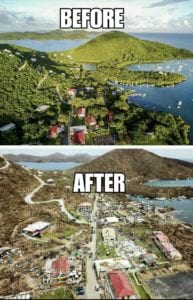
“How do we let our parents know we’re okay?” thought Quevedo. There was no internet or cell-phone reception anywhere on the island after the hurricane, and in order to secure any form of communication, they would have to wait for the military to arrive.
So at this point, Quevedo took matters into her own hands. Although she couldn’t promise cell-phone reception, she did have a lot of organizational experience as a faculty advisor for the Health Executive Student Organization at FIU, where she received her bachelor’s in biology.
She figured she could do her best for the students and faculty of Dominica by administering a plan to salvage what could be salvaged. Upon walking to campus from the apartment with her friend in the building, that is exactly what she did along with other students who were willing to show their mettle in a time of crisis.
The school had evacuation plans in place for the students, but they would have to wait until they could be put to action. In Dominica, a great number of places lost electricity and water, but Ross University was one spot that did not.
According to Quevedo, the necessary first step on the first day was for students and on-site college security to make an accounting of all students and personnel. Administrators would eventually make it to campus from their outlaying homes, because so many of them had to hike their way in due to all the debris blocking the roads. So for now, the students were pretty much on their own.
“These lists would be used to make the first calls back to the U.S. (via satellite phone) where we would speak directly – in the middle of the night – to the college deans based in the States,” she said.
It was terrifically arduous but a necessary exercise, having to read each student name and ID number, one by one, hour after hour. “But we obviously had to stick with it until all students were accounted for.”

Quevedo also assumed a position of leadership and rallied students to help clean up the school facilities and grounds, and once the U.S. military arrived, she helped facilitate the evacuation of injured persons, families, women, and men. The first ship evacuated on the Saturday following the hurricane.
“There were a lot of limitations,” she said, “And flying off the island was not an option.”
These immediate tasks served to keep everyone preoccupied. But soon, reality set in. Over the next two days, students were forced to wait for the water system to start back up. “During this period, some of the students bathed in rivers, others not at all,” said Quevedo. “Thankfully, we had drinking water that the school provided to us.”
The military did begin arriving a few days later. “It was seeing those helicopters that gave us the hope we’d been waiting for,” she said. “They helped with evacuation and setting order on campus. They were there to protect us and all U.S. citizens that were on the island of Dominica. They brought us MRE’s and other supplies we needed.”
It was soon after the first evacuation ship sailed that the four sat-phones were finally freed up by the military and the Ross evacuation team so that people could start making calls. The families of students abroad had no idea whether their sons, daughters, sisters, and brothers were dead or alive since all communication to the outside world was not to be found.
Phone calls were limited to one minute, but, said Quevedo, “We simply had to let people talk a little longer… When I spoke to my mom she burst out into tears because she really thought that I was dead.”
The long wait was still to be had before more students could evacuate to the nearby island of St. Lucia, where students would then board aircraft to Miami, and yet another plane if they lived elsewhere in the States.
Before that time came, people had to find food where they could. The nearby Chinese market greatly aided the university by selling their goods at a discounted price. Students from the university, including Quevedo, got together and were led by a fellow student who had experience working large-scale cafeterias. They successfully cooked and distributed the food to students and faculty, assuaging all fears of hunger.
“At first, there was plenty of light, snack-type food, but after a few days, we were longing for a real meal,” Quevedo said. “So again, a core of students came together to put the campus kitchen to use, by cooking meals for their fellow students, staff, and anyone else on campus.”
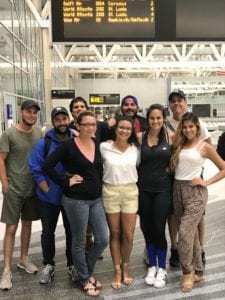
All of the evacuation operations proceeded smoothly, and finally, after long laborious days assuring that every student spoke to their family and had evacuation plans in place, Quevedo left the island of Dominica for St. Lucia.
Quevedo was temporarily at her mom’s home in Miami, where she stayed with her family, and enjoyed time with her fiancé, Peter Sosa. When asked how she could possibly describe her role in the wake of the storm, she gave a humble answer: “I’m a student that was able to help in a time of crisis.” Of course what she accomplished in a time of need for her fellow students was so much bigger.
Ross University remains closed until further notice. Quevedo has since left Miami again, along with the many other students set on continuing their studies, by setting sail on a floating university – meaning they are attending class onboard an offshore ship in international waters.
Dominica is still undergoing reconstruction to ensure a safe return for its residents, but there is no current date as to when everything will be restored completely. Quevedo’s plans after medical school are to return to Miami and study for her board certification, do her residency at Jackson, and finally, have kids and enjoy of life of caring for others.






Comments are closed.